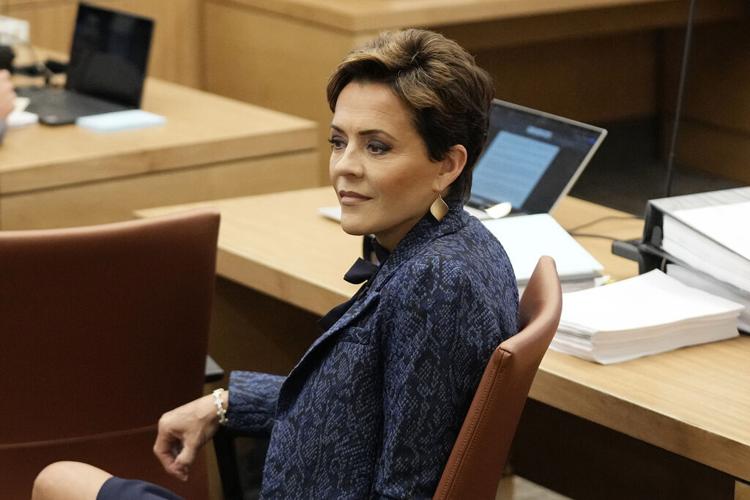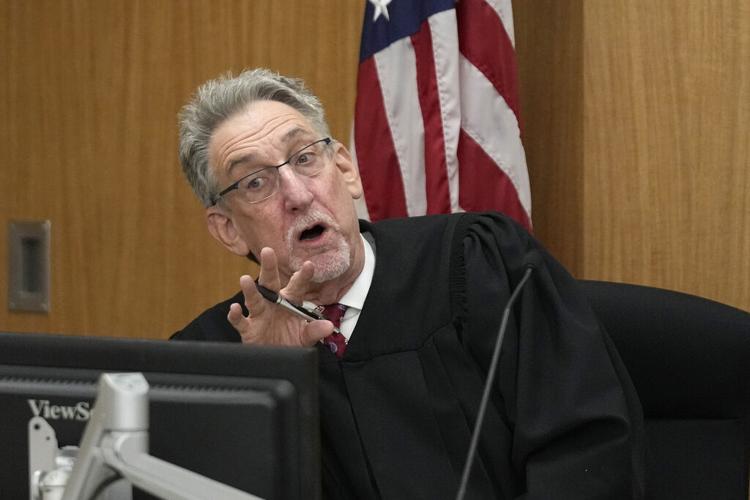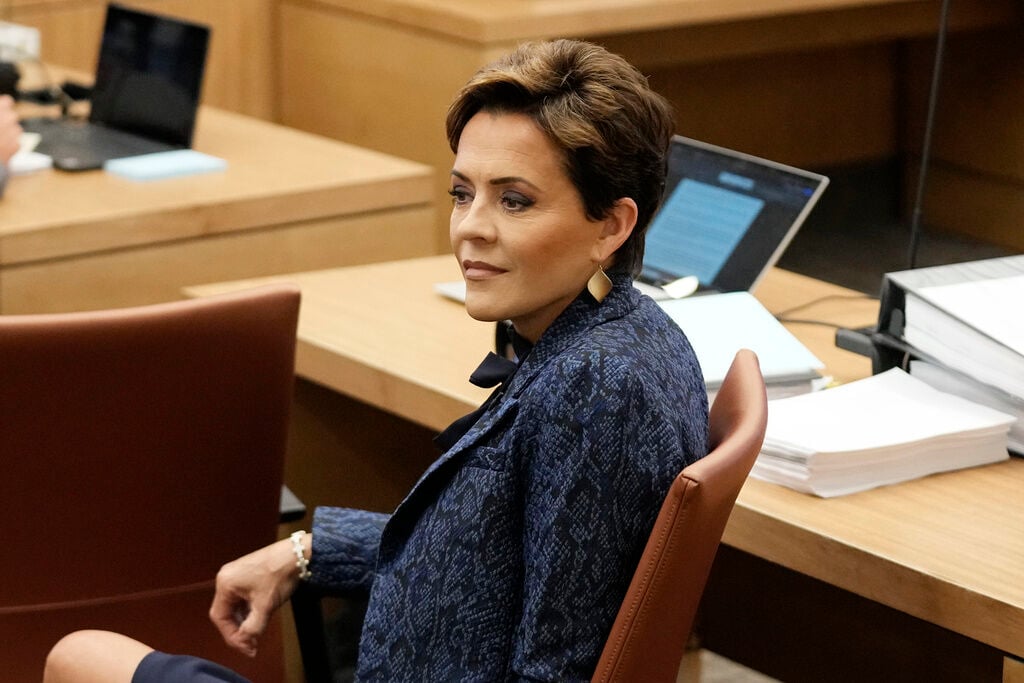PHOENIX — An attorney for Maricopa County told a judge Monday he should reject Kari Lake’s attempt to get images of ballot envelopes and signatures because that’s not allowed under the law.
Lake, the Republican who lost the 2022 governor’s race, wants to see the signatures to buttress her claim Maricopa County counted some early ballots it shouldn’t have.
Joseph La Rue, the lawyer for Maricopa County, does not dispute that Arizona law presumes all records in the custody of government agencies are presumed to be public.
But he said a section of the state Election Code spells out that voter registration records “shall not be accessible or reproduced by any person other than the voter.’’ That should end the matter, as it overrides laws that presume public disclosure, he told Maricopa County Superior Court Judge John Hannah.

Maricopa County Superior Court Judge John Hannah comments at court Monday during a bench trial on Kari Lake's lawsuit over voting records.
A judge in another, unrelated case has ruled the signatures on the ballot envelopes do not become a part of the voter’s registration record that are confidential. But La Rue urged Hannah to ignore that other ruling as irrelevant to this case.
If the judge isn’t buying that argument, the Maricopa County lawyer has a fallback.
He said even assuming the records are public and even if the judge does not accept his claim they are confidential under the Election Code, Arizona law allows records to be withheld if their release is “not in the best interests of the public.’’
Voters testify about privacy concerns
La Rue got several witnesses to testify about their fears of what would happen if their signatures on their ballot envelopes were released to anyone who asks for them.
Lake is challenging her election loss to Democrat Katie Hobbs, claiming early ballots were counted where the signatures did not match the voters’ signatures already on file elsewhere in county records.
Early ballots trended to Hobbs, and Lake contends there were enough bad signature matches to overturn her 17,117-vote loss in November. Granting her request would allow her to have someone review all 1.3 million early ballots cast in Maricopa County.
At Monday’s hearing, Maricopa County voter Bonnie Eckard testified that two people came to her door in August 2021 to ask her about the 2020 election, the one Donald Trump contends he was cheated out of, a position supported by Lake.
“They immediately began to pepper me with questions that they seemed to already have the answer to,’’ she said, including if certain people lived there, did they vote Democratic, did they vote by mail, did anyone else vote from that house, and whether they received extra ballots. Eckard said about the only answer she got when she asked who they were was “something about election integrity.’’
She said the questioners were “extremely aggressive with me,’’ at one point telling her “about dead people voting’’ and spouting “unproved conspiracy theories.’’
La Rue said Eckard and others fear their signatures on ballot envelopes become public it will lead to more harassment. That will result in some people giving up the right to vote by mail or giving up the right to vote at all, he said.
Phone numbers
But Lake’s attorney, Bryan Blehm, pointed out that to voters’ signatures already are publicly available elsewhere, on everything from property deeds filed with the County Recorder’s Office to signatures on petitions to nominate candidates or put a measure on the ballot.
He got Eckard to acknowledge that the public availability of those signatures would not preclude her from signing petitions or buying a new home.
Hannah, however, said the availability of signatures elsewhere is likely irrelevant to the narrower question before him of whether these particular signatures on ballot envelopes are public records.
La Rue said it isn’t just about signatures. He pointed out the ballot envelopes Lake wants to see usually contain voters’ phone numbers.
While it’s not required, voters are asked to provide phone numbers in case county election officials have questions about what might be a mismatched signature, or in cases where someone forgets to sign. It provides a quick method of contacting the voter.
La Rue told the judge that if voters balk at providing that number, it could result in some people’s ballots never getting counted.
An unsigned ballot envelope has to be fixed or “cured’’ by 7 p.m. on Election Day in order to be counted. Mismatched signatures get a bit more time: five business days after the election.
Maricopa County Recorder Stephen Richer has testified that’s easy now with access to voter phone numbers. But he said meeting those deadlines could prove impossible if hundreds of thousands of voters, fearing their phone numbers would become public if Lake wins her case, choose to leave them off the ballots.
Judge’s questions
Voters’ addresses are also on those early ballot envelopes.
“We have a track record of people going canvassing, door to door, to ask people about their early ballot, and who they voted for and whether or not it was their signature,’’ La Rue said.
“That creates a risk that voters will be harassed,’’ he continued. “And this could ultimately disenfranchise voters because voters become fearful that if we vote, we may get accosted about it.’’
Blehm told Hannah there’s nothing inherently wrong with people canvassing neighborhoods about elections. The judge had questions, not the least of which relates to the fact that he said canvassing usually occurs before an election.
“What do I do about what these witnesses said?’’ Hannah asked Blehm. “Should I not believe them when they say that they were frightened and offended that people came around after the election ... questioning them about their votes?’’
“We have a 200-plus-year history of doing this type of activity, canvassing, going and talking to voters, going door to door,’’ Lake’s attorney responded. Hannah again pointed out that is usually pre-election activity.
The judge also appeared to be unimpressed with Blehm’s argument that voter signatures are available elsewhere, like on publicly recorded documents and petitions. He said this case is being argued under an entirely different provision of the law.
Hannah also pointed to a 1998 ruling in a case where a Phoenix TV station sought the phone numbers of teachers in Scottsdale Unified School District as part of an investigation into whether the district was doing proper background checks to see if teachers were sex offenders.
In that case, the Arizona Supreme Court acknowledged the phone numbers might be available elsewhere. But the justices said that was irrelevant and that, publicly available or not, teachers have a privacy interest in their phone numbers and the district was not obligated to provide information the teachers had provided to it.
Hannah did not say when he will rule.
Get your morning recap of today's local news and read the full stories here: tucne.ws/morning.






